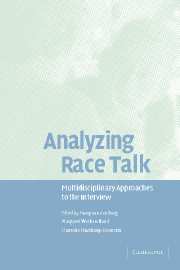Book contents
- Frontmatter
- Contents
- List of contributors
- Preface
- Acknowledgments
- Transcriptions symbols
- Introduction
- 1 Racism and the analysis of cultural resources in interviews
- 2 Analyzing racial discourse: the discursive psychology of mind–world relationships
- 3 Constructivist processes in discourse: a cognitive linguistics perspective
- 4 Institutional, professional, and lifeworld frames in interview talk
- 5 The uses of absurdity
- 6 Multiple voices in talking race: Pakeha reported speech in the discursive construction of the racial other
- 7 Contradictions in interview discourse
- 8 Racism, happiness, and ideology
- 9 The frame analysis of research interviews: social categorization and footing in interview discourse
- 10 Affiliation and detachment in interviewer answer receipts
- 11 Interviewer laughter as an unspecified request for clarification
- 12 Perspectives and frameworks in interviewers' queries
- Appendix: Interview transcripts
- Index
6 - Multiple voices in talking race: Pakeha reported speech in the discursive construction of the racial other
Published online by Cambridge University Press: 22 September 2009
- Frontmatter
- Contents
- List of contributors
- Preface
- Acknowledgments
- Transcriptions symbols
- Introduction
- 1 Racism and the analysis of cultural resources in interviews
- 2 Analyzing racial discourse: the discursive psychology of mind–world relationships
- 3 Constructivist processes in discourse: a cognitive linguistics perspective
- 4 Institutional, professional, and lifeworld frames in interview talk
- 5 The uses of absurdity
- 6 Multiple voices in talking race: Pakeha reported speech in the discursive construction of the racial other
- 7 Contradictions in interview discourse
- 8 Racism, happiness, and ideology
- 9 The frame analysis of research interviews: social categorization and footing in interview discourse
- 10 Affiliation and detachment in interviewer answer receipts
- 11 Interviewer laughter as an unspecified request for clarification
- 12 Perspectives and frameworks in interviewers' queries
- Appendix: Interview transcripts
- Index
Summary
Starting from the premise that “the racial other” is a discursive object socially constructed through talk, this chapter examines a particular kind of talk, reported speech, and how it is used to articulate Pakeha positions. Reporting speech, for example, quoting another's words, can be a powerful conversational practice due to “the double-voiced quality” of those words (Bakhtin 1984), in that the words of the original speaker are given voice by the reporting speaker. In giving voice to another's words through reported speech, the current speaker also assesses that speech and discursively positions him/herself in relation to it. In this chapter, Pakeha talk about the other is examined through a consideration of reported speech and its surrounding sequential context.
Discursive constructions of the racial other
Racial categories are commonly thought of as reflecting natural groupings of peoples based on cultural or physiological differences. Contrary to this common-sense view, there seems to be a growing consensus that such categories are discursive constructions rather than natural categories reflecting inherent (essentialized or genetic) differences among peoples (Miles 1989; Sanjek 1994; Winant 1994). As a discursive construction, the notion of “the other” involves the ways people talk and represent social realities about difference, particularly racial, ethnic, or cultural difference (Houston 1994; Verkuyten, DeJong, and Masson 1995; Wetherell and Potter 1992).
In the literature, most discourse analyses have examined Whites' (e.g., Northern Europeans, North Americans, New Zealanders) talk about racial others.
- Type
- Chapter
- Information
- Analyzing Race TalkMultidisciplinary Perspectives on the Research Interview, pp. 103 - 118Publisher: Cambridge University PressPrint publication year: 2004
- 5
- Cited by



